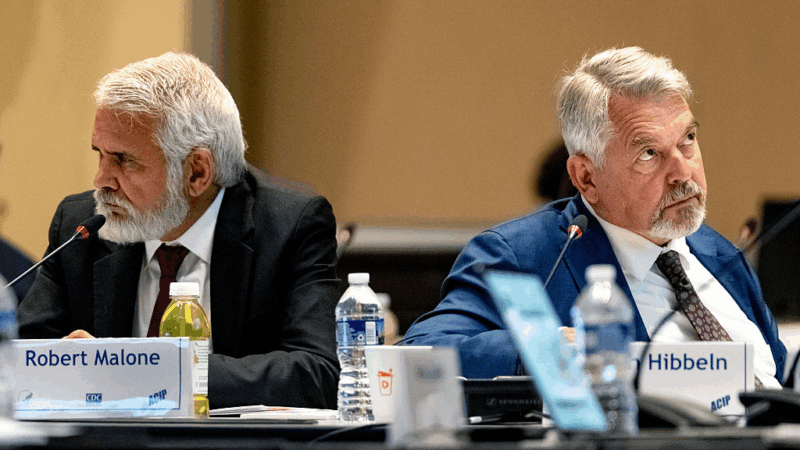RFK Jr.’s vaccine advisers raise disproven fears about the preservative thimerosal
An influential committee that shapes U.S. vaccine policy – a flashpoint under the leadership of Secretary of Health Robert F. Kennedy Jr. – has recommended that adults and children no longer receive flu vaccines containing trace amounts of a preservative that’s rarely used anymore.
The discussion of thimerosal, a form of mercury that’s sometimes added to vaccines for sterilization, dominated much of Thursday’s public meeting of the Advisory Committee on Immunization Practices, or ACIP. The committee guides the Centers for Disease Control and Prevention on the vaccine schedule for children and adults.
The two-day meeting at CDC headquarters in Atlanta was unusually high-profile, given Kennedy’s recent decision to boot the entire committee of experts a few weeks ago and replace them with his own hand-picked roster, which included some members with a history of making inaccurate claims about the safety of vaccines.
While ACIP typically includes 17 voting members, Kennedy’s overhauled panel only included seven of them, following a last-minute decision by one of them to step down.
On Thursday, a majority of the panel voted to reaffirm the existing CDC recommendations that anyone over six months receive the annual flu shot. They also voted 5-2 in favor of a monoclonal antibody shot made by Merck that offers protection against respiratory syncytial virus, or RSV, for infants younger than 8 months.
But in three separate votes the committee voted to recommend children, pregnant women and all adults receive single-dose flu immunizations with vaccines that don’t have thimerosal.
Theories that the chemical could cause autism in children have long been disproven. Even so, manufacturers voluntarily removed it from childhood vaccines. While it’s used in some multi-dose vials in several products, there are no vaccines on the pediatric vaccine schedule that contain thimerosal.
The ACIP votes could effectively ban use of the preservative, despite a preponderance of evidence that it is safe.
Dr. Cody Meissner, a professor of pediatrics at Dartmouth College, was the only ACIP member who voted against those recommendations.
“Of all the issues that ACIP needs to focus on, this is not a big issue,” he said. “The risk from influenza is so much greater than the non-existent, as far as we know, risk from thimerosal.”
He added: “There is no scientific evidence that thimerosal has caused a problem.”
Meissner’s comments came in response to a lengthy presentation on the preservative from Lyn Redwood, a nurse and former president of Children’s Health Defense, the anti-vaccine advocacy group that Kennedy founded and led for many years.
“Removing a known neurotoxin from being injected into our most vulnerable population is a good place to start with making America healthy again,” she told the committee.
Much of what Redwood said about thimerosal was undercut by a CDC document that had been originally posted with the meeting materials — and then without explanation removed ahead of the meeting. It detailed peer-reviewed literature showing “no association between prenatal exposure to thimerosal-containing vaccinations and autism spectrum disorder in children.”
In response to a question about why the document had been taken down, Dr. Robert Malone, an ACIP member, said his understanding was that it had not been “authorized by the Office of the Secretary.”
Members of the committee questioned the analyses provided by CDC, and wondered whether they were ignoring data on adverse events that showed up in relation to the studies they presented, even after the staff explained they had parsed the data thoroughly.
Prominent medical groups welcomed the recommendations on flu and RSV, but expressed concern about the overall tone of the meeting.
Dr. Sean O’Leary, who chairs the Committee on Infectious Diseases for the American Academy of Pediatrics, said the ACIP discussion on influenza and RSV “confirmed that this is an orchestrated effort to sow distrust in immunizations and the vaccine approval process.”
While the person serving as CDC director would typically sign off on ACIP recommendations, there is no one in the role currently, so the responsibility for signing off on these recommendations go to Health Secretary Kennedy.
Malinowski concedes to Mejia in Democratic House special primary in New Jersey
With the race still too close to call, former congressman Tom Malinowski conceded to challenger Analilia Mejia in a Democratic primary to replace the seat vacated by New Jersey Gov. Mikie Sherrill.
FBI release photos and video of potential suspect in Guthrie disappearance
An armed, masked subject was caught on Nancy Guthrie's front doorbell camera one the morning she disappeared.
Reporter’s notebook: A Dutch speedskater and a U.S. influencer walk into a bar …
NPR's Rachel Treisman took a pause from watching figure skaters break records to see speed skaters break records. Plus, the surreal experience of watching backflip artist Ilia Malinin.
In Beirut, Lebanon’s cats of war find peace on university campus
The American University of Beirut has long been a haven for cats abandoned in times if war or crisis, but in recent years the feline population has grown dramatically.
Judge rules 7-foot center Charles Bediako is no longer eligible to play for Alabama
Bediako was playing under a temporary restraining order that allowed the former NBA G League player to join Alabama in the middle of the season despite questions regarding his collegiate eligibility.
American Ben Ogden wins silver, breaking 50 year medal drought for U.S. men’s cross-country skiing
Ben Ogden of Vermont skied powerfully, finishing just behind Johannes Hoesflot Klaebo of Norway. It was the first Olympic medal for a U.S. men's cross-country skier since 1976.







